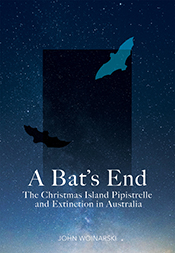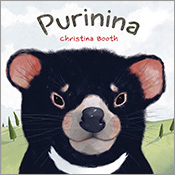A Bat's End

The Christmas Island Pipistrelle and Extinction in Australia
By: John WoinarskiThe compelling story of a bat, the scientists who tried to save it, its island habitat – and its extinction.
On the evening of 26 August 2009, the last known pipistrelle emerges from its day-time shelter on Christmas Island. Scientists, desperate about its conservation, set up a maze of netting to try to catch it. It is a forlorn and futile exercise – even if captured, there is little future in just one bat. But the bat evades the trap easily, and continues foraging. It is not recorded again that night, and not at all the next night. The bat is never again recorded. The scientists search all nearby areas over the following nights. It has gone. There are no more bats. Its corpse is not, will never be, found. It is the silent, unobtrusive death of the last individual. It is extinction. + Full description
This book is about that bat, about those scientists, about that island. But mostly it is an attempt to understand that extinction; an unusual extinction, because it was predicted, witnessed and its timing is precise.
A Bat's End is a compelling forensic examination of the circumstances and players surrounding the extinction of the Christmas Island pipistrelle. A must-read for environmental scientists, policy-makers, and organisations and individuals with an interest in conservation.
Recipient, 2019 Whitley Awards Certificate of Commendation: Conservation Biology
- Short descriptionReviews
"This detailed and insightful forensic analysis of the pipistrelle's extinction provides an excellent lesson in biodiversity management, and offers a moral/ ethical framework from which to consider attitudes towards responsible ecological stewardship. A Bat's End will be of considerable interest and importance to bat biologists, conservationists, naturalists, ecologists, and environmental policymakers, and a welcome addition to the bookshelf of anyone interested in bats."
Danny A. Brass, NSS News, October 2018
"A very thorough analysis of a difficult problem, very readable and something that should guide revision of Australia’s niggardly and
misconceived approach to management of threatened species."
Robert Bender, Australian Bat Society Newsletter (51 & 52), Late 2018-Early 2019
"This book is a fascinating, in-depth analysis of the pressures that humans place on the world we live in written by one of the world’s leading conservation biologists. It is clear that Woinarski enjoyed being freed from the confines of the journal article format because the language is a joy to read – complex and elegant but still precise and deliberate."
James M. Turner, Ecological Management & Restoration 20(2), May 2019
"This book represents an invaluable and tangible lesson of how humans should avoid mismanagement of fragile ecosystems because mismanagement can trigger an ecological catastrophe."
Citlali Mendoza, Carlos A. Barrera, and Jorge Ortega, Journal of Mammalogy 100(2), April 2019
"A very thorough survey of the widespread, growing problem of extinctions, A Bat’s End is also highly readable, well illustrated and indexed, with many lessons for conservation management."
Robert Bender OAM, The Victorian Naturalist 136(1), February 2019
"I would recommend this book to all conservation professionals, particularly those working with threatened taxa or threatened communities,
or indeed anyone working within the administration, management and policy areas of conservation."
Graham R. Fulton, Pacific Conservation Biology 25, 2019
"Readers familiar with Woinarski’s many contributions will know he is an exceptionally gifted writer. This book well evokes the sadness, frustration and anger that this extinction caused him, alongside many in the conservation community who cared for this bat in various ways."
Euan Ritchie, Historical Records of Australian Science 31(1) 2020
"Beyond the specifics of Christmas Island or the fate of a single island endemic bat species, the book offers an approach to thinking about species conservation and impresses the reality that effective conservation is context-dependent and complex to execute, especially in remote areas for species with limited information to support decisive action."
Winifred F. Frick, The Quarterly Review of Biology, Vol 94, June 2020
"Whether we think specifically of endangered bats, from loss of habitat; diseases such as white nose syndrome; climate change; and now COVID-19 related reprisals; or whether we think of extinctions of all creatures, and the unravelling of ecologies everywhere, A Bat’s End provides much material worth considering for the difficult journey ahead."
Tessa Laird, Australian Journal of Environmental Education 36(3), November 2020
Details
Paperback | September 2018 | $ 59.99ISBN: 9781486308637 | 280 pages | 245 x 170 mm
Publisher: CSIRO Publishing
Illustrations, Photographs
ePDF | September 2018
ISBN: 9781486308644
Publisher: CSIRO Publishing
Available from eRetailers
Features
- Fascinating forensic examination of the processes and players involved in the extinction of the Christmas Island pipistrelle bat, including personal accounts of ecologists, administrators and politicians.
- Considers our relationship with nature, and the extent to which we should and do care for nature
- Uses the Christmas Island pipistrelle bat’s extinction as a case study, from which lessons can be learned that will resonate more broadly
- Examines Australia’s environmental law and policy, and provides recommendations to strengthen these
- Foreword written by Tim Low, renowned Australian environmental consultant and author
Contents
ForewordThe end
1. Introduction
2. The conservation value and challenge of islands
3. The stage – Christmas Island
4. The unravelling of the Christmas Island environment – change, loss and response
5. The Christmas Island pipistrelle
6. Why did the pipistrelle disappear? – the drivers of extinction
7. Why did the pipistrelle disappear? – management and policy responses and failings
8. Personal perspectives, responses and responsibilities
9. Lessons and generalisations
Acknowledgements
Endnotes
References
Index
View the full table of contents. (PDF, 80kb)
Authors
John Woinarski is an Australian ecologist with a particular interest in, and concern for, threatened species and their proximity to extinction. He has published widely on research, policy and management, with particular focus on Australian birds and mammals. He is co-author of the authoritative Action Plan for Australian Mammals 2012.








